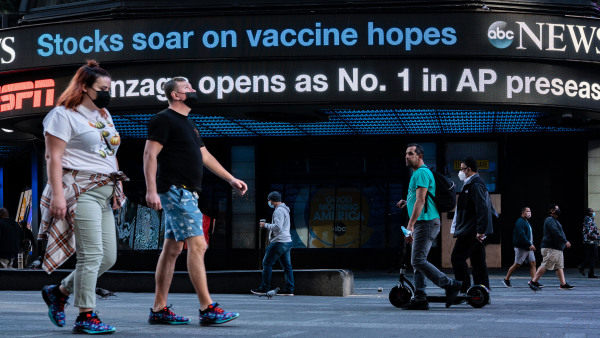
Date: 14 November 2020
Author: Katie Martin and Robin Wigglesworth
Source: Financial Times
Earlier on Monday, Pfizer unveiled its coronavirus breakthrough and the news electrified the financial markets. Investments poured into global stock funds through the week, breaking records of at least two decades.
Stock inflows in the week to Wednesday amounted to $44.5bn, including more than $32bn invested into US stock funds, according to data provided EPFR Global, making it the largest weekly haul by equity funds recorded by EPFR, as well as the second-biggest intake by US stock funds since 2000. The record-breaking event spans from investors putting their money on the vaccine from Pfizer and Germany’s BioNTech in a hope to quicker global recovery.
The new commitments were driven by large institutional investors, including pensions and endowments, which added $41.1bn to their stock positions this week. Retail investors, by contrast, accounted for just $3.3bn of the inflows. While online brokerages such as Robinhood have had a surge of trading activity this year, much of it has been directed to individual stocks, bypassing traditional fund managers.
Climbing more than 9 per cent since the start of November, marking benchmark S&P 500 best 10 trading days since April, when the Federal Reserve promised additional support for the market and stocks bounced off of their lows for the year. The index closed at a new record high on Friday for the first time since the start of September.
“The vaccine announcement supercharged the ‘return to normalcy’ rally that followed the US election,” said Matt Gertken, a strategist at BCA Research. “It will take time to distribute these vaccines but the world can look toward economic recovery next year.”
The rotation back into US stocks reversed the vast majority of outflows tallied since the year began, and followed the result that Joe Biden had won the US election. US equity futures began rallying on that news, which preceded the announcement from Pfizer and BioNTech on Monday morning.
With the victory of Mr Biden, expectations of investors have now shifted to more predictable policymaking and economic stimulus, says Cameron Brandt, Director of Research at EPFR. He also added that the influx of cash into equity funds favoured large-cap companies, even though small-caps had far outpaced their bigger rivals over the five trading days.
The prospect of a divided government, where Republicans hold the Senate, has also prompted investors to dial back their expectations of dramatic regulatory or tax changes when president-elect Biden is inaugurated in January, Allianz Global Investors portfolio manager Burns McKinney said.
That could boost stocks further. John Normand, a strategist with JPMorgan Chase, said on Friday that US stocks had “one of the best backdrops for sustained gains in years” and that the election outcome presented a “Goldilocks outcome for equities”. The bank forecasts the S&P could climb a further 12 per cent to reach 4,000 by early next year.
Rising coronavirus cases and further travel restrictions could still hamper US equities, and Lisa Erickson of US Bank Wealth Management said she was still avoiding the “scene of the accident” stocks hit hardest by the pandemic. However she said that vaccine developments had provided new optimism to the market.
“That provides not certainty but some nice tailwind for further reopenings and upturn,” she added.
Keyword : sterlinghousetrust.com, Sterling House Trust, SHT
Sterling House Trust is a private trust with a difference. It offers its members an exclusive and reliable platform to access unique opportunities and lifestyle services reserved for the select few. With its team of professional managers Sterling House Trust constantly scans the markets and collaborate with reliable global partners to create a portfolio of carefully curated programmes for its members. Members can access these programmes according to their individual needs, interest and financial capacity. Sterling House Trust is headquartered in Auckland, New Zealand, and has operations based in London, UK.
The Sterling House Trust platform was established with the objective of providing its members, secure access to opportunities across a range of global locations, sectors and services.

Our unique Platform was established within the framework of a trust so that the trust would have oversight and governance over the range of services and its quality. Member protection is a core principle and drive in all that we do. Our trustees ensures that the interests and quality of service provided by the Platform are always maintained at the highest standards.
The trust and its trustees provide robust oversight and is constantly on the move to identify and shortlist select opportunities in the international markets. Likewise, we apply the same stringent standards in identifying and selecting providers and professional partners to join our Platform.
The Sterling House Trust Platform utilises our international footfall and relationships to provide our members with access to a range of international opportunities via our global network which covers a broad range of sectors including:
Asset protection, international property ownership and management, alternative and direct ownership, estate planning, banking services, foreign exchange, card services, alternative investment and lifestyle services.

New Zealand Head Office
31/335 Lincoln Road,
Addington
Christchurch
New Zealand
London Office
14-16 Dowgate Hill,
London,
England EC4R 2SU